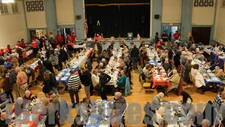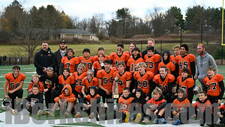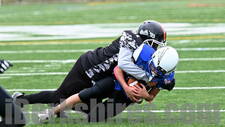Hopper Trail Hiker RescuedBy Susan Bush
12:00AM / Saturday, January 07, 2006
Williamstown – A 43-year-old female hiker was carried from the Hopper Trail on Jan. 7 after rescue workers initiated a post-sundown rescue.
A hiking companion contacted town police via a cellular telephone at 5:06 p.m. and reported that 43-year-old Heather Wilson of Hartford, Conn., was stricken with severe exhaustion and possible hypothermia, was unable to continue the trek off of the trail, and required assistance, according to town police. The caller said that Wilson did not sustain a hiking injury, police said.
Town police officers, members of the town volunteer fire department, members of the Pownal volunteer fire department, and Village Ambulance Service emergency medical technicians erected a temporary command post at the base of the trail and launched a rescue mission.
Rescuers reached Wilson’s location, which was about one-quarter mile from the trail base, at about 6:06 p.m. and brought her to a waiting ambulance, police said. She was taken to the North Adams Regional Hospital.
No further information about Wilson’s condition was available on Jan.7.
The Saturday weather was clear and cold, with air temperatures hitting the mid-20 degree Fahrenheit level.
Winter Hiking Safety
Numerous Internet web sites offer winter hiking and camping safety imformation.
Tips for winter hikes include:
Dressing in layers of clothing made from synthetic materials. Cotton clothing is not recommended because once wet, it offers no protection to a hiker. An example of layering includes polyester or polypropylene “long johns,†two layering shirts, fleece or tight-weave wool pants, a fleece jacket, and an outer layer of waterproof pants and jacket. A scarf or other neck covering is essential, as is a hat and gloves or mittens. Weatherproof boots and warm socks are very important and most hiker information web sites encourage carrying a spare pair of socks so that feet may remain dry.
Carry plenty of water and an insulated container of hot tea or soup. Snacks that can be eaten while walking are recommended. Some suggested snacks are foods that can be carried in jacket pockets, such as energy bars, chocolate bars, and dried fruit packets.
Walk at a steady pace that is capable of generating body heat but does not produce sweating.
Practice hiking at safe locations, such as in the vicinity of one’s home, when possible. Trial outings can provide awareness of a hiker’s physical condition and the durability, practicality, and function of hiking apparel.
Be prepared; while a hike may be planned as a daytime trek, unexpected incidents can keep hikers on the trail after sunset. Carry a flashlight, matches, and handwarmers.
Winter hiking safety information was acquired at www.thetrailmaster.com, www.wcnet.org, and www.hikingbuzz.com Internet web sites. Additional information is available at these and other web sites.
Susan Bush may be reached via e-mail at suebush@iberkshires.com or at 802-823-9367.
|


















